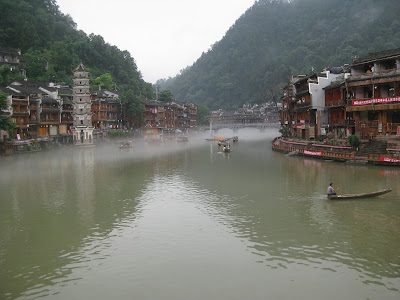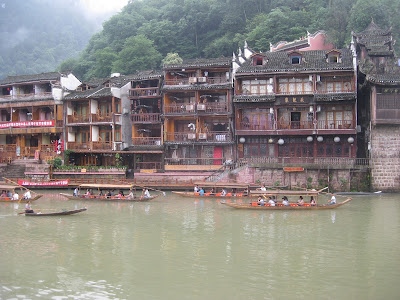It’s
lunchtime in Fenghuang and we are the only customers in the tiny restaurant of
four or five tables. It’s in an alley of grey brick buildings and uneven stone
slabs close to the turbid Tuo River and, unusually, it looks clean. One of the three
staff sits by the entrance and tries half-heartedly to drum up some business, calling
out ‘chifan ma?’ (‘do you want to
eat?) to passers-by. It’s a losing battle, for the streets are strangely empty,
the tsunami of Chinese tourists having vanished in the intense midday heat.
We order rice, a plate of
fried tofu and salty, charred pork, and an aubergine dish. The food is
delicious. I knock back two bottles of very weak Snow beer, whose alcohol
content is below 2.5%. We get talking to the two young local women who cook and
serve the food. Unusually for Fenghuang, they are friendly. They complain about
the recent introduction of 148 yuan (about 15 pounds) tickets that give access
to large areas of the Old Town. Businesses have been hit hard, they say.
Indeed, this small ‘ancient town’ in Hunan province in the south of
China is all about business, specifically the tourist kind. You get the feeling
that most locals look upon visitors as little more than cash cows. The
extortionate levy for entering the Old Town makes you feel like you’re in a
theme park. Worst of all are the town’s taxi drivers; they are shameless
rip-off merchants, overcharging anyone who fails to converse in the local
dialect.
And yet, I liked Fenghuang. Early in the morning, before
the Chinese holidaymakers have taken control, a resonant pat-pat-pat sound
comes from the edge of the river. It is the noise of a handful of bendy women washing
clothes, and beating them against the floor with some kind of paddle. Parts of
the river are veiled in mist at this hour. Deeply tanned boatmen with muscular
arms stand or sit at the back of sampans, alternately using a sturdy bamboo
pole or an oar to propel small groups of tourists over the water. Their songs
rise above the hum of voices coming from the banks.
Traditional and photogenic buildings of three, four
and five stories border the river, which is about fifty metres wide. They have
wooden balconies and balustrades, sloping roofs with dark tiles and hanging
basket chairs. Some even stand on wooden stilts, though it’s hard to believe
they offer a very firm foundation.
The narrow and sweltering
streets of Fenghuang are for all the senses. Men strut around, their shirts
rolled up above their fat bellies for coolness. Women from the Miao ethnic minority sit listlessly
beneath cone-shaped hats made from bamboo leaves, hawking boat rides and photo
opportunities with local girls in headdresses made of silver and shocking pink
or red dresses.
Charred and flattened pigs’ heads hang outside
restaurants, and piles of broken roof tiles litter the streets. A yellow star
on a grubby wall and some flaking Chinese script serve as a reminder that you are
in a Communist state, though the orgy of money-making all around you tells its
own story. Then there are the smells: incense, grilled lamb cooked by Uighurs,
the rancid stench of rotting food from bins, and urine in the back alleys.
There is an ugly side to
Fenghuang, though, aside from the effort to squeeze every yuan out of visitors.
Signs of abject poverty are visible, like the hapless beggars in the gallery
atop the handsome three arch sandstone bridge. Blatant racism is on display
too, for a bright red sign outside one establishment informs Japanese visitors that
they are not permitted to enter. (Perhaps not surprisingly, I saw no Japanese
in Fenghuang.)
I also witnessed a fight - at about nine in the morning. At the foot of the sandstone
city wall, several metres below me, a shouting match between
two furious local men degenerated into a scuffle. Peering over the battlements,
I took in the chaotic scene. One of the men was lying on top of his foe, and
landed a punch in his face. Five or six locals – family members, I guess - were
more or less involved: there was an old woman brandishing a small chair over
her head, an old man trying to pull the pugilists apart, and a woman of about
thirty lying unconscious beside the mêlée.







